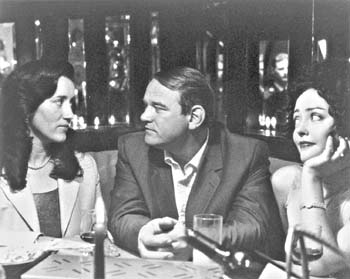Cannes-zilla
Kiss and Tell: Robert Benigni's 'Life Is Beautiful' starts as slapstick and ends as an upbeat 'Schindler's List.'
An outsider's diary from the megasized Cannes Film Festival, or Planet Hollywood on the Riviera
By Rob Nelson
WEDNESDAY, MAY 13--After being awake for 30 straight hours, I arrive at the Cannes Film Festival's bunkerlike Palais des Festivals just in time to hear Martin Scorsese say that he'll "always be indebted to French cinema." I'd be indebted to a warm bed right about now, but the masochist in me--the part that decided to come to Cannes in the first place--wants to see how this year's legendarily obsessive president of the jury will address the world's movie lovers.
"The great French New Wave directors were particularly valuable to me in the early '60s," Scorsese says, "when they taught me so much about American cinema."
Translator and so-called mistress of ceremonies Isabelle Huppert issues a befuddled "Quoi?"--not knowing how to interpret this sentiment for French-speaking cinéastes. Scorsese restates the idea, but Huppert's tentative translation still seems to miss his reference to the New Wave auteurs' work as critics. Being a critic myself, I feel grateful for the nod, especially since my second-tier status here means that I'm reviewing this gala kickoff at Cannes on closed-circuit TV.
THURSDAY, MAY 14--This year's 12-day marathon has drawn 4,000 journalists. I don't know exactly how many fans, film publicists and industry bottom-feeders are here this time, except to say that it can be extremely time-consuming--when not impossible or dangerous--to walk from one end of Cannes' main drag, the Croisette, to the other.
Does the event really need to be this big? Mais oui. From mid- to late-May, this isn't Cannes: It's Planet Hollywood. Everything is outsized, egos not the least. Size matters here: Not for nothing has Godzilla been selected as the closing-night film, even though, by any other standard, the choice is hugely indefensible.
Friday, May 15--Alienated outsiderdom is fast emerging as a theme at this festival. The first film of the morning is Ken Loach's My Name Is Joe--as in "My name is Joe, and I'm an alcoholic." Hi, Joe.
According to Loach (Land and Freedom), the protagonist (Peter Mullan) is an Everyman representing larger struggles, but here they're personal, as Joe quits the sauce and courts a sweet social worker (Louise Goodall) but still can't control his temper. The film deftly approximates the man's mounting rage with a slow-burn plot that gradually becomes a showdown between Joe and the local mob.
Later that afternoon, the outsider of the Australian Dance Me to My Song--a woman with severe cerebral palsy, played by a woman (Heather Rose) in the same condition--takes me by complete surprise. It renders in truly harrowing detail the life of Julia (Rose) as she struggles to communicate by computerized voice box, outsmart her horribly cruel nanny (Joey Kennedy) and, in her spare time, win the hand of a nice guy named Eddie (John Brumpton).
Rolf de Heer's unflinching direction notwithstanding, this is indeed "a film by Heather Rose," who not only gives a fierce performance but also co-wrote this love triangle variation on her life story. The near-10-minute standing ovation bodes well in commercial terms for a film that could tap some of the same real-life underdog appeal as Shine.
SATURDAY, MAY 16--Today is my first-ever visit to the Director's Fortnight, the anti-Cannes offshoot that Godard and Truffaut started in May of 1968 in protest of the main festival's bourgeois politics.
The film is Todd Solondz's follow-up to Welcome to the Dollhouse, called Happiness--an ironic/sarcastic title if there ever was one. Like Dollhouse, only more so, this film depicts (or delivers?) an endless amount of fear and loathing under the guise of the blackest comedy: One character, a clean-cut and conservative suburban father (Dylan Baker), recalls a cathartic dream about gunning down random strangers in a park, then, wide awake, goes to his car and jerks off to a teen magazine.
To an extent, one appreciates the director's view that America is sick, suburbia is polluted, most men are sickos, some women are mean and pathetic, and all children are victims. But then what? Solondz successfully beats the viewer into submission--and so the cycle of abuse continues.
Monday, May 18--Halfway through the festival and nothing in the competition has approached true greatness: Loach and Terry Gilliam fall somewhat short of their best work; Patrice Chereau's Ceux qui m'aiment prendront le train (Those Who Love Me Can Take the Train) is a wildly overwrought melodrama about an extended family whose every member has some sexual "problem" (homosexuality, transvestitism, female hysteria); Claude Miller's La classe de neige (The Class Trip) depicts a young boy's Freudian daydreams, but without dreaming much itself; and Roberto Benigni's bizarre, obnoxious Life Is Beautiful turns from a featherweight slapstick comedy into a more upbeat Schindler's List, being perhaps the closest we'll come to seeing Jerry Lewis' notoriously unreleased Holocaust melodrama The Day the Clown Cried.
Tuesday, May 19--As I'm straining to distinguish between the dozen movies I've seen, I overhear the journalist next to me making desperate calls to England and the States to try to get herself into the epic MTV/Godzilla party at the Majestic Beach.
The day's anti-Godzilla party is a press conference symposium with veteran directors of photography Raoul Coutard (who shot many of Godard's early works) and Jack Cardiff (who filmed Michael Powell's Black Narcissus and A Matter of Life and Death, among others).
Coutard confesses that Breathless seemed nothing special when he was shooting it; Cardiff asserts that the current crop of new directors ("these film-school kids who've seen everything") tend to tell the cinematographers exactly what they want, minimizing the craftsman's input, whereas Alfred Hitchcock or King Vidor would simply say, "Jack, I want a feeling of sadness here," and turn him loose.
Tonight is the press screening of one of the most challenging films in the festival, Hou Hsiao-hsien's The Flowers of Shanghai, a snail-paced portrait of brothel life in late 19th-century Shanghai, shot in static tableaux, like a filmed play. At least a quarter of the audience walks out before it's over--perhaps trailing the media monster's footprints down to the beach.
WEDNESDAY, MAY 20--At long last, le cinéma. Lars von Trier's Idioterne (The Idiots) proposes an odd solution to alienation, following a group of beautiful young nomads who go around impersonating retarded people as a rebellious means of raw self-expression and subcultural fraternizing. Put it this way: If Emily Watson's fragile Bess from von Trier's Breaking the Waves had joined these fun-loving folks to "find her inner idiot," she probably wouldn't have needed to give herself to God.
Although The Idiots is the uncredited second film in von Trier's newly formed cinema collective (his name isn't on it), this is unmistakably the work of the man who made Waves--the same aesthetic mix of jump-cuts and seasick camerawork capturing the metaphoric story of people too delicate for this world, fighting to assert themselves amid the powers that be.
Leave it to Lodge Kerrigan, director of the bleak Amerindie Clean, Shaven, to return us to the land of the lost. Kerrigan's Claire Dolan is a tightly controlled, nearly suffocating investigation of the life of a New York prostitute (Katrin Cartlidge) who struggles to put some distance between herself and her manipulative pimp (Colm Meaney), enlisting the aid of a scruffy cab driver (Vincent D'Onofrio) to give her love and then father her child.
Thursday, May 21--Halfway through actor-director John Turturro's boring Illuminata, I bolt, just barely making it into a market screening of the buzz movie in competition, La vie rêvée des anges (The Dreamlife of Angels). This incisive study of the shifting relationship between two young Frenchwomen (Elodie Bouchez and Natacha Regnier) is riveting for seeming as real as any doc. (Sony Pictures Classics picked it up for distribution yesterday, meaning it may appear before year's end.)
La vie is one of those films that keeps bringing back true film lovers to places like Cannes. Indeed, as mass-released "alternative" fare like Good Will Hunting continues to make foreign art cinema an iffy prospect anywhere, film cognoscenti visit festivals at any cost because surprises at home are few and far between.
In other words, for critics, the film festival has become the last, best art house. But since that art house isn't open to the general public, reporting on it is to risk irrelevance or loss of employment--which only makes the situation worse.
Friday, May 22--Speaking of said lineup, every once in a while the former indie company's clout lands a Velvet Goldmine--that is, a film by a smart, iconoclastic, politically minded director, designed expressly to subvert the status quo of visual, narrative and sexual representation. Or so would say Todd Haynes groupies, whose ranks have grown considerably since the director's masterfully ironic Safe risked commercial failure in 1995.
Thus, Haynes' hugely ambitious glitter-rock epic struts into competition today carrying a lavender-colored feather boa in one hand and the Miramax logo in the other--and, on top of it all, the very heaviest of critical expectations.
The film's opening title seeks to settle us all down: "Although what you are about to see is a work of fiction, it should nevertheless be played at maximum volume." The word "fiction" is key, as Haynes stacks layer after layer of flamboyant artifice atop stardust memories of the '70s' queer youth culture's yearning for "ch-ch-ch-changes"--precisely the project of glam rock itself.
Ewan McGregor plays rocker Curt Wild as a teasing mix of Iggy Pop and Lou Reed; the svelte Jonathan Rhys-Myers plays omnisexual icon Brian Slade as an ever-evolving amalgam of David Bowie, Bryan Ferry and Oscar Wilde; and Christian Bale plays the '80s-era reporter assigned to discover what happened to citizen Slade (as in Citizen Kane), and to the '70s spirit of personal, sexual and artistic experimentation.
Sunday, May 24--About 30 of us gather outside the press room to scribble down the names of the award winners. Befitting its president, the jury is evenhanded. Haynes takes the Prix de Meilleure Contribution Artistique (Best Artistic Contribution), thanking Oscar Wilde and Roxy Music "for giving us so much to aspire to."
Hal Hartley wins the screenplay prize for Henry Fool; John Boorman is awarded Best Director for The General, his so-so bio-pic of Irish thief Martin Cahill; Peter Mullan takes the actor's prize for My Name Is Joe; Bouchez and Regnier split the Best Actress award; Benigni gets the Grand Prix for Life Is Beautiful (and proceeds to kneel at Scorsese's feet); and the top-prize Palme D'Or goes to Theo Angelopoulos for Eternity and a Day--which seemed to last about that long.
Now that the serious side of Cannes is fini, I'm ready to battle the crowds for Godzilla--which I could have done at the Mall of America. As the French would say, "Plus ça change ..." My plane doesn't leave for two more days, but in a way--in the biggest way--I'm already home.
[ San Jose | Metroactive Central | Archives ]
![]()

Sergio Strizzi
Table Talk: Maria Doyle Kennedy (left), Brendan Gleeson and Angeline Ball in John Boorman's prize-winning 'The General.'
From the May 28-June 3, 1998 issue of Metro.
![[Metroactive Movies]](/movies/gifs/movies468.gif)